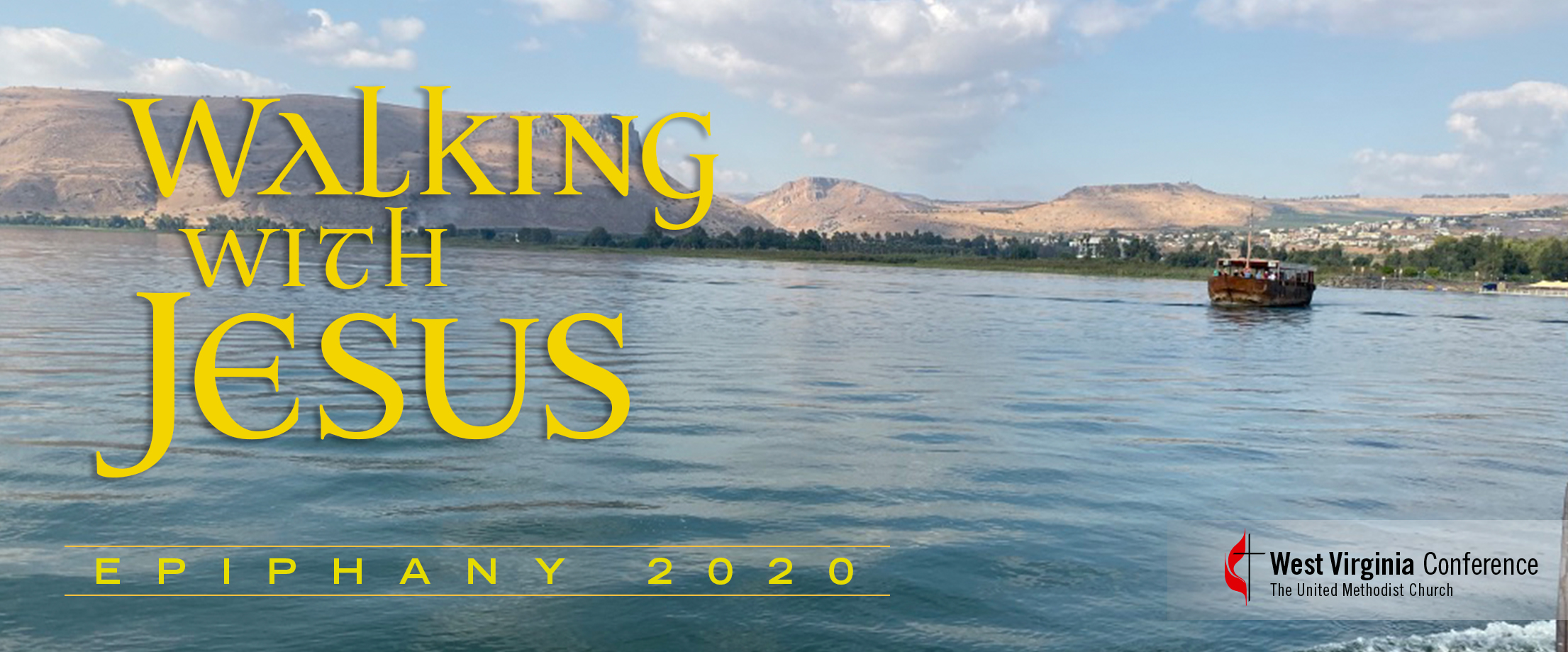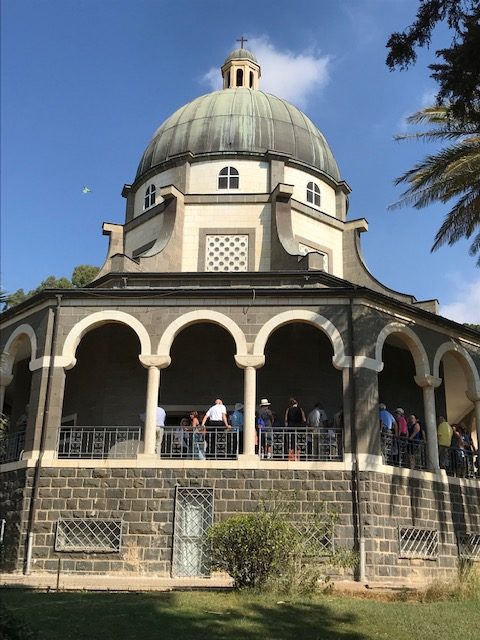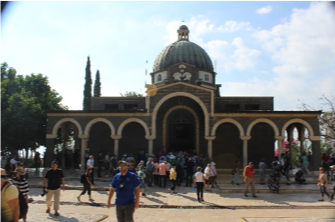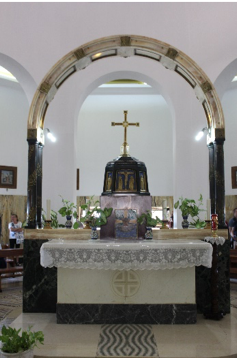
"Now when Jesus saw the crowds, he went up on a mountainside and sat down. His disciples came to him, 2 and he began to teach them..."
The Beatitudes may be the most famous sermon ever given. This week's lectionary passages are: Matthew 5:1-12, Micah 6:1-8, Psalm 15 and 1 Corinthians 1:18-31.
Follow this link for worship resources for this Sunday, the 4th Sunday of Epiphany, 2020, included are call to worship, opening prayer and Great Thanksgiving for Communion.
Sarah Fletcher
Davis, WV
Potomac Highlands District
In picking a date from the list for the Reflections on Walking with Jesus, I chose the one with scripture from Matthew 5; 1-12. How coincidental is that one that is from the Sermon on the Mount and titled the Beatitudes.
It is now 6 weeks since returning from Israel as part of the conference group and knowing I needed to write my reflection when still “fresh” in my mind. My history with Israel is that this is the third time I have been to the Holy Land: in 2011, 2018, and now 2019. All the trips are under the direction of Educational Opportunity (EO). They do an amazing job in organizing and providing the opportunity for a Spiritual Experience in each place where Jesus actually “walked” 2000 years ago.
One of my “favorite Holy Sites” is the Mount of the Beatitudes that overlooks the Sea of Galilee. To those who have not seen pictures of the site, the church is the focal point. Inside, the Beatitudes are listed around the chapel above eye level. On the outside they are carved onto stones set along the entry walkway to the chapel.
On the first trip in 2011, we were able to be inside the chapel and visualize what it was like in Christ’s day on the hillside. The last two trips, the crowds were phenomenal and I did not attempt to enter the sanctuary.
 I walked along the porch and the paths around the mount. Plants and flowers were everywhere and tucked in corners were small areas where one could sit and mediate or watch the Galilee and the birds flying about. Of course, there is a gift shop where you can purchase meaningful gifts or souvenirs to share with people back at home in church or community. The chapel is under the care of an order of Sisters and they have their donation baskets set out. My main regret is that in each visit, we were only given an hour or less to walk about or sit and reflect either in the chapel or on the grounds.
I walked along the porch and the paths around the mount. Plants and flowers were everywhere and tucked in corners were small areas where one could sit and mediate or watch the Galilee and the birds flying about. Of course, there is a gift shop where you can purchase meaningful gifts or souvenirs to share with people back at home in church or community. The chapel is under the care of an order of Sisters and they have their donation baskets set out. My main regret is that in each visit, we were only given an hour or less to walk about or sit and reflect either in the chapel or on the grounds.
The Beatitudes are guidelines that Christ gave to his disciples and to the crowds that followed him. They are a standard of conduct for all believers. They contrast heavenly values with worldly values. They contrast the superficial faith of the Pharisees with Real Faith that Jesus displayed. They show how Old Testament expectations will be fulfilled in the New Kingdom to come.
Blessed is more than happiness, it is love and joy of God Jesus and our earth. Our time here in this world as we know it is only temporary. God has great rewards for us that stay faithful, despite trials, temptations and distractions.
In Summary, Micah 6:8 (being part of this day's selection) says What we are to do as Christians;
“He has showed you, O Man, what is good. And What does the Lord require of you? To Act justly and to love mercy and to walk humbly with your God.” Amen.
Rev. Bart Thompson
Northern District
Warwood-Short Creek UMCs
Read Matthew 5:1-12
We are in the season after Epiphany. This is a season of ordinary time with the scriptural focus of calling the disciples and the early ministry of Jesus. This time after the rush of Advent-Christmas-Epiphany is a pause before the next holy season of Lent-Easter-Pentecost. In some parts of the Church this is also a season of carnival- celebration of God’s blessing and presence with us in daily life.
However, the most important action of this season/time is for us intentionally to look for the manifestation (or light) of Christ in the ordinary daily life of ourselves-modern disciples. Where do you see Christ? What is Christ calling you to do? How will you love and serve both God and neighbor?
When I went to the Middle East. I was struck by the difference in culture, climate, history, and the use of walls. I saw ancient walls built to protect people from other people. I saw ruins of Roman, Byzantium, Crusader, and Ottoman walls. The most common feature was that, over time, all the walls from every tribe that tried to rule this beautiful land all collapsed. Every imperial group who built something to keep others out and divide people and keep communication from happening all failed in the end.
Where is the light of Christ in building walls? Where is the manifestation of our Lord in living in fear of people who are different than ourselves?
Christ is not in wall building. Christ is in the face of the people who are cut off and can’t build community or lives because someone else has stopped trying to talk. The light of Christ is in the truth that walls do not work.
The musician Leonard Cohen sings in his song Anthem, “There is a crack in everything, that’s how the light gets in.” I believe that is how Jesus gets in through all the walls. There is a crack in every wall in the world, no matter their location.
Someday, this wall will collapse. Someday, peace will be manifested in the land of our savior’s birth. Someday, the light will get through. God only needs a crack. Someday, the light of Christ will be manifested not only in the Middle East, but also in our part of the world, and Christ’s teachings on that hillside will come true, “Blessed are those who hunger and thirst for righteousness, for they will be filled. Blessed are the merciful, for they will receive mercy. Blessed are the pure in heart, for they will see God. Blessed are the peacemakers, for they will be called children of God.”
Something to Ponder: How is the light of Christ pushing you to chip away at the walls in your life?
Rev. Mike Linger
Director, House of the Carpenter
Northern District
Upon entering the Mount of the Beatitudes, you discover a beautiful garden with engraved stones echoing one of the Beatitudes. It is also a garden filled with people; a large crowd of many nationalities, differing dress and varied languages. Throughout the garden, tour guides try to find a spot to gather their group and convey the history, meaning and significance of the site.
As I walked through the throng, I could imagine the first crowd coming up the hillside. Excited voices, skeptical voices, tired voices; all coming to hear an itinerate preacher from Nazareth speak. Through the garden, all I could imagine was the crowd. Yet, upon passing through the doorway to the chapel, where silence is mandated, your thoughts centered on the words; “Blessed are”.
Out of the crowd, Jesus called his disciples, and he began to teach them. In my mind, it wasn’t just the 12, but all those who would step out from the masses and choose to begin a journey of faith. Hearing the noise outside, yet surrounded by silent disciples inside; I began to hear these familiar words differently. Generally, I’ve always heard them as an individual, referring to the life of one person. This time, however, I was hearing them as words that indicated what the community of Jesus would embody.
 Blessed are the poor in spirit. What if the community of faith took the time to know the struggles, stresses, burdens, and heartache that accompanies life in poverty? What if, with this understanding, the body of Christ intentionally and purposefully ministered with the poor?
Blessed are the poor in spirit. What if the community of faith took the time to know the struggles, stresses, burdens, and heartache that accompanies life in poverty? What if, with this understanding, the body of Christ intentionally and purposefully ministered with the poor?
Blessed are those who mourn. Mourning not just for our personal grief, although that is real, but mourning with others as well. Mourning for children dying of malnutrition. Mourning for victims of violence, abuse and neglect. Mourning for victims of war, addiction, and hate.
Blessed are the meek; in an era of exaggerated bravado, inflaming rhetoric and divisive commentary; what if humility, grace, love and compassion could become the characteristics of the faith community?
Blessed are those who hunger and thirst for righteousness. Consumerism drives us to crave stuff. Anxiety elicits us to desire control. Fear pushes us to desire power. Yet, seldom has the question been asked, “What is pleasing in the sight of God?” We are less likely to ask the question if the response might require some adjustment in our lives.
Blessed are the merciful. When our culture fosters arguments, even encourages fighting one another where is the voice of mercy heard? While we stockpile the injustices done against us, and disregarding what we might do to another; is there room for forgiveness?
Blessed are the pure in heart. Our world seems to feed upon anger, division, bitterness, lust, greed, hate, racism, sexism and the list goes on. Jesus calls the disciples to have a heart filled with a purity summed up by love of God and love of neighbor; regardless of who that neighbor might be.
Blessed are the peacemakers. In an age when parents fight at children’s sports events, brawls erupt at political rallies, bullies troll real life and social media; the disciple is called to be a person of peace walking with the heart of Jesus in a broken world.
If the community of faith, those called disciples of Jesus Christ, embodied these blessings, it would indeed be a persecuted community. This faith community would be a counterculture to most of our social, economic, and political world. The fact that there isn’t persecution is a harsh reminder that upon leaving the chapel, most of the folks who gathered to pray in the chapel simply melted back into the crowd. These were nice words, good thoughts but not really practical for the real world.
What we forget is these words are the instructions to the disciples of Jesus. They were not spoken as a hope of some embodying this way of life. They were spoken in a manner that says; these blessings will indicate those who are walking in Jesus’s way, that is the journey toward real life.